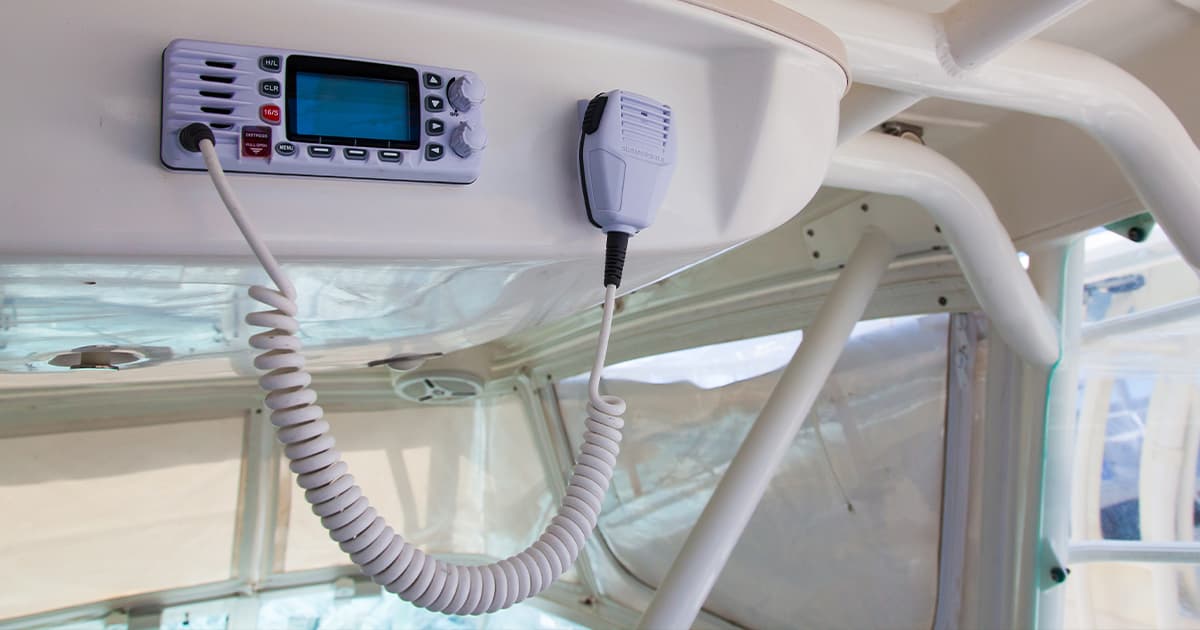Why Does My Boat Need a VHF Radio?

One of the most important pieces of safety equipment that every boater should have is a VHF (Very High Frequency) marine radio.
A VHF marine radio allows instant communication between your boat and other boats, marinas, bridges, and the Canadian Coast Guard.
What is a VHF Radio?
You can call the Canadian Coast Guard on VHF channel 16.
A VHF radio is a transceiver used for two-way communication between vessels and shore stations. Unlike a regular AM/FM radio, a VHF radio operates on specific frequencies reserved for maritime use.
These frequencies allow for clear communication over long distances, making it an invaluable safety tool for boaters.
Key Reasons Your Boat Needs a VHF Radio
- Emergency communication: One of the primary reasons to have a VHF radio on your boat is for emergency communication. In the event of an emergency, such as engine failure, capsizing, or a medical issue, you need a reliable way to call for help. Cell phones, while useful, can have limited coverage and battery life out on the water. A VHF radio, on the other hand, is designed for marine environments and provides a direct line to the Coast Guard and other rescue services. The ability to send a distress signal (MAYDAY) or a call for urgent assistance (PAN-PAN) can be lifesaving.
- Weather updates: Weather conditions can change rapidly on the water. A VHF radio allows you to receive real-time weather updates from NOAA (National Oceanic and Atmospheric Administration). These updates include weather forecasts, warnings, and marine conditions that can help you make informed decisions about whether to head out, stay put, or return to shore.
- Navigational aid: A VHF radio is not just for emergencies and weather updates. It also serves as a navigational aid. You can communicate with other vessels to avoid collisions, seek advice on navigating tricky waters, and even get assistance with docking.
- Coordination and communication: Whether you're part of a boating club, participating in a regatta, or just out with friends, a VHF radio facilitates easy coordination and communication between vessels. This can be especially useful when traveling in groups, ensuring everyone stays together and arrives safely at the destination.
- Legal requirement: In some areas, carrying a VHF radio is a legal requirement, especially for larger vessels or those venturing into international waters. Even if it’s not mandated by law in your area, having one on board demonstrates a commitment to safety and preparedness.
Additional boating safety tips
While having a VHF radio is crucial, it's just one part of a comprehensive safety plan. Here are some additional boating safety tips to consider:
- Wear life jackets: Always wear a life jacket and ensure there are enough for everyone on board. Make sure they are in good condition and fit properly. It's a simple measure that can save lives.
- Create a float plan: Before heading out, create a float plan that details your intended route, departure and return times, and names of everyone on board. Share this plan with someone on shore so they know where to start looking if you don’t return as scheduled.
- Perform regular maintenance: Keep your boat in good working order by performing regular maintenance checks. This includes inspecting the engine, checking fuel levels, and ensuring all safety equipment is functional.
- Carry a first-aid kit: A well-stocked first aid kit is essential for treating minor injuries and stabilizing more serious ones until help arrives. Make sure it includes bandages, antiseptics, medications, and any personal medical supplies.
- Understand navigation rules: Familiarize yourself with the "rules of the road" for boating. This includes knowing right-of-way rules, navigational markers, and signals. Proper knowledge helps prevent accidents and ensures smooth interactions with other vessels.
- Avoid alcohol: Operating a boat under the influence of alcohol is not only illegal but also extremely dangerous. Alcohol impairs judgment, coordination, and reaction times, significantly increasing the risk of accidents.
- Check the weather: Always check the weather forecast before setting out. Be aware of potential storms, high winds, and other hazardous conditions. If the weather looks unfavorable, it’s best to postpone your trip.
- Stay hydrated and sun protected: Boating can be physically demanding and being out in the sun for extended periods can lead to dehydration and sunburn. Drink plenty of water, wear sunscreen, and use protective clothing to stay safe and comfortable.
- Know your boat’s limitations: Understand the capabilities and limitations of your boat. Don’t overload it with passengers or gear and /avoid pushing it beyond its intended use. Respecting your vessel's design and limits is key to safe boating.
By prioritizing safety and being prepared, you can ensure that every boating trip is a pleasant and secure experience. Remember, the key to a great day on the water is preparation, awareness, and having the right equipment – and that starts with a reliable VHF radio.



